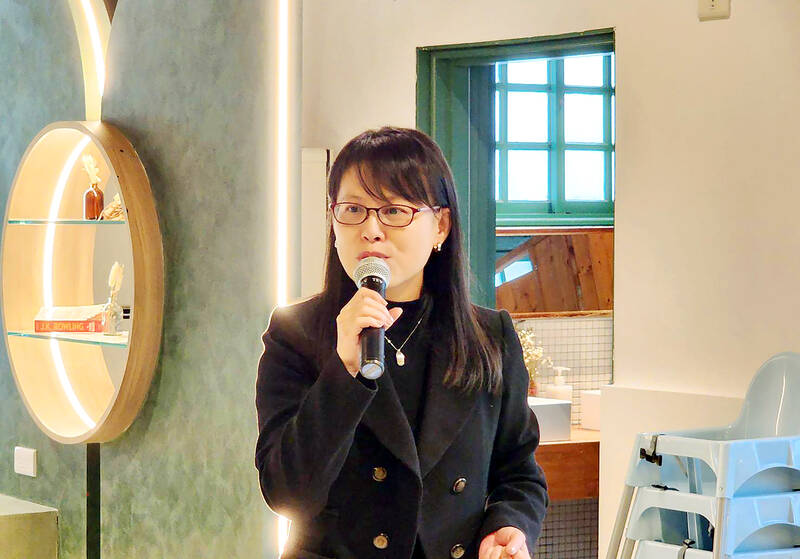Lion Travel Service Co (雄獅旅行社) yesterday said that it expects to break even this year, ending three consecutive years of losses caused by the COVID-19 pandemic.
Lion Travel general manager and spokeswoman Ann Lai (賴一青) said the company expects revenue to rise to 50 percent of pre-pandemic levels this year, after having its operations upended by the virus from 2020 to last year.
Taiwan’s reopening in October last year has allowed overseas travel to recover, Lai said, adding that the reopening has not weakened demand for domestic tourism.

Photo: CNA
“Recovery in air transport capacity will be the biggest uncertainty,” she said.
Long-distance air transport capacity has returned to 40 to 50 percent of pre-pandemic levels in the US and Europe, and 30 to 40 percent of the pre-pandemic level in Japan, Lai said, adding that demand for overseas travel would peak in the summer.
The prices of overseas package tours rose 20 to 30 percent from pre-pandemic levels and are unlikely to fall soon, due to tight air capacity, higher hotel rates and other cost increases in the supply chain, she said.
The cost of group tours for the upcoming cheery blossom festival in Japan are 20 to 30 percent higher from pre-pandemic levels, Lai said.
Meanwhile, the cost of domestic tours for the upcoming Lunar New Year holiday are up 10 percent from pre-pandemic levels, she said.
Lion Travel would dynamically adjust its packages and prices in response to market changes, she added.
The company has secured 15 percent of all Japan-bound airplane seats through charter flights, Lai said.
Lion Travel is also looking at a fast recovery in cruise tour demand this summer, she said, adding that average group charges have climbed 20 percent for 24 voyages.
The pandemic has prompted the company to evolve into a lifestyle brand, and tap into cultural tours at home and abroad, she said.
Lion Travel reduced the number of physical offices from 80 to 20 in the past three years to cut losses, but plans to add 10 to 30 offices this year in line with business improvement, Lai said.
The company would set up offices in Vietnam, Malaysia, Indonesia, Germany and other location to better integrate tourism resources and serve its customers, she said.
Lion Travel plans to expand its staff to the pre-pandemic level of 3,600 people, from 2,000, Lai said, adding that it has raised average monthly wages by 15 percent to NT$32,000 this year.

HANDOVER POLICY: Approving the probe means that the new US administration of Donald Trump is likely to have the option to impose trade restrictions on China US President Joe Biden’s administration is set to initiate a trade investigation into Chinese semiconductors in the coming days as part of a push to reduce reliance on a technology that US officials believe poses national security risks. The probe could result in tariffs or other measures to restrict imports on older-model semiconductors and the products containing them, including medical devices, vehicles, smartphones and weaponry, people familiar with the matter said. The investigation examining so-called foundational chips could take months to conclude, meaning that any reaction to the findings would be left to the discretion of US president-elect Donald Trump’s incoming team. Biden

INVESTMENT: Jun Seki, chief strategy officer for Hon Hai’s EV arm, and his team are currently in talks in France with Renault, Nissan’s 36 percent shareholder Hon Hai Precision Industry Co (鴻海精密), the iPhone maker known as Foxconn Technology Group (富士康科技集團) internationally, is in talks with Nissan Motor Co’s biggest shareholder Renault SA about its willingness to sell its shares in the Japanese automaker, the Central News Agency (CNA) said, citing people it did not identify. Nissan and fellow Japanese automaker, Honda Motor Co, are exploring a merger that would create a rival to Toyota Motor Corp in Japan and better position the combined company to face competitive challenges around the world, people familiar with the matter said on Wednesday. However, one potential spanner in the works is

Call it an antidote to fast fashion: Japanese jeans hand-dyed with natural indigo and weaved on a clackety vintage loom, then sold at a premium to global denim connoisseurs. Unlike their mass-produced cousins, the tough garments crafted at the small Momotaro Jeans factory in southwest Japan are designed to be worn for decades, and come with a lifetime repair warranty. On site, Yoshiharu Okamoto gently dips cotton strings into a tub of deep blue liquid, which stains his hands and nails as he repeats the process. The cotton is imported from Zimbabwe, but the natural indigo they use is harvested in Japan —

HON HAI LURKS: The ‘Nikkei’ reported that Foxconn’s interest in Nissan accelerated the Honda-merger effort out of fears it might be taken over by the Taiwanese firm Nissan Motor Co has become the latest buyout target in Japan as it explores a merger with Honda Motor Co and faces an overture from Hon Hai Precision Industry Co (鴻海精密), known as Foxconn Technology Group (富士康科技集團) internationally. Shares in Nissan yesterday jumped 24 percent, the most on record, to hit the daily limit, after the two Japanese automakers acknowledged that talks are ongoing to better position themselves for competitive challenges during a time of upheaval in the global auto industry. Foxconn — a Taipei-based manufacturer of iPhones, which has been investing heavily in factories to build electric vehicles — has also